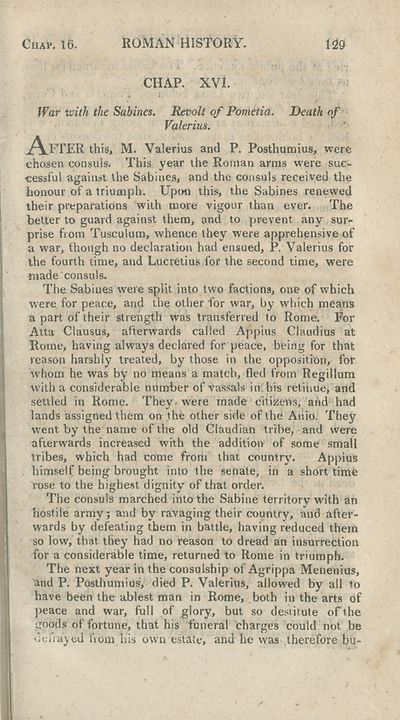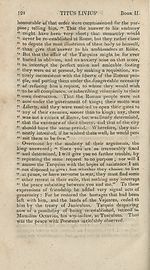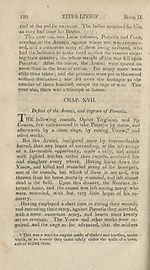Download files
Complete book:
Individual page:
Thumbnail gallery: Grid view | List view

Chap. 16. ROMAN HISTORY.
129
CHAP. XVI.
IVar with the Sabines. Revolt of Pometia. Death of
chosen consuls. This year the Roman arms were suc¬
cessful against the Sabines, and the consuls received the
honour of a triumph. Upon this, the Sabines renewed
their preparations with more vigour than ever. The
better to guard against them, and to prevent any sur¬
prise from Tusculum, whence they were apprehensive of
a war, though no declaration had ensued, P. Valerius for
the fourth time, and Lucretius for the second time, were
made consuls.
The Sabines were split into two factions, one of which
were for peace, and the other for war, by which means
a part of their strength was transferred to Rome. For
Atta Clausus, afterwards called Appius Claudius at
Rome, having always declared for peace, being for that
reason harshly treated, by those in the opposition, for
whom he was by no means a match, fled from Regillum
with a considerable number of vassals in: his retinue, and
settled in Rome. They - were made citizens, and had
lands assigned them on the other side of the Anio. They
went by the name of the old Claudian tribe, and were
afterwards increased with the addition of some small
tribes, which had come from that country. Appius
himself being brought into the senate, in a short time
rose to the highest dignity of that order.
The consuls marched into the Sabine territory with an
hostile army; and by ravaging their country, and after¬
wards by defeating them in battle, having reduced them
so low, that they had no reason to dread an insurrection
for a considerable time, returned to Rome in triumph.
The next year in the consulship of Agrippa Menenius,
and P. Posthumius, died P. Valerius, allowed by all to
have been the ablest man in Rome, both in the arts of
peace and war, full of glory, but so destitute of the
goods of fortune, that his funeral charges could not be
•‘c,'rayed fiom his own estate, and he was therefore bu-
Valerius.
Valerius and P. Posthumius, were
129
CHAP. XVI.
IVar with the Sabines. Revolt of Pometia. Death of
chosen consuls. This year the Roman arms were suc¬
cessful against the Sabines, and the consuls received the
honour of a triumph. Upon this, the Sabines renewed
their preparations with more vigour than ever. The
better to guard against them, and to prevent any sur¬
prise from Tusculum, whence they were apprehensive of
a war, though no declaration had ensued, P. Valerius for
the fourth time, and Lucretius for the second time, were
made consuls.
The Sabines were split into two factions, one of which
were for peace, and the other for war, by which means
a part of their strength was transferred to Rome. For
Atta Clausus, afterwards called Appius Claudius at
Rome, having always declared for peace, being for that
reason harshly treated, by those in the opposition, for
whom he was by no means a match, fled from Regillum
with a considerable number of vassals in: his retinue, and
settled in Rome. They - were made citizens, and had
lands assigned them on the other side of the Anio. They
went by the name of the old Claudian tribe, and were
afterwards increased with the addition of some small
tribes, which had come from that country. Appius
himself being brought into the senate, in a short time
rose to the highest dignity of that order.
The consuls marched into the Sabine territory with an
hostile army; and by ravaging their country, and after¬
wards by defeating them in battle, having reduced them
so low, that they had no reason to dread an insurrection
for a considerable time, returned to Rome in triumph.
The next year in the consulship of Agrippa Menenius,
and P. Posthumius, died P. Valerius, allowed by all to
have been the ablest man in Rome, both in the arts of
peace and war, full of glory, but so destitute of the
goods of fortune, that his funeral charges could not be
•‘c,'rayed fiom his own estate, and he was therefore bu-
Valerius.
Valerius and P. Posthumius, were
Set display mode to:
![]() Universal Viewer |
Universal Viewer | ![]() Mirador |
Large image | Transcription
Mirador |
Large image | Transcription
| Antiquarian books of Scotland > Curiosities & wonders > Titus Livius' Roman history > (133) |
|---|
| Permanent URL | https://digital.nls.uk/115984745 |
|---|
| Description | Thousands of printed books from the Antiquarian Books of Scotland collection which dates from 1641 to the 1980s. The collection consists of 14,800 books which were published in Scotland or have a Scottish connection, e.g. through the author, printer or owner. Subjects covered include sport, education, diseases, adventure, occupations, Jacobites, politics and religion. Among the 29 languages represented are English, Gaelic, Italian, French, Russian and Swedish. |
|---|

